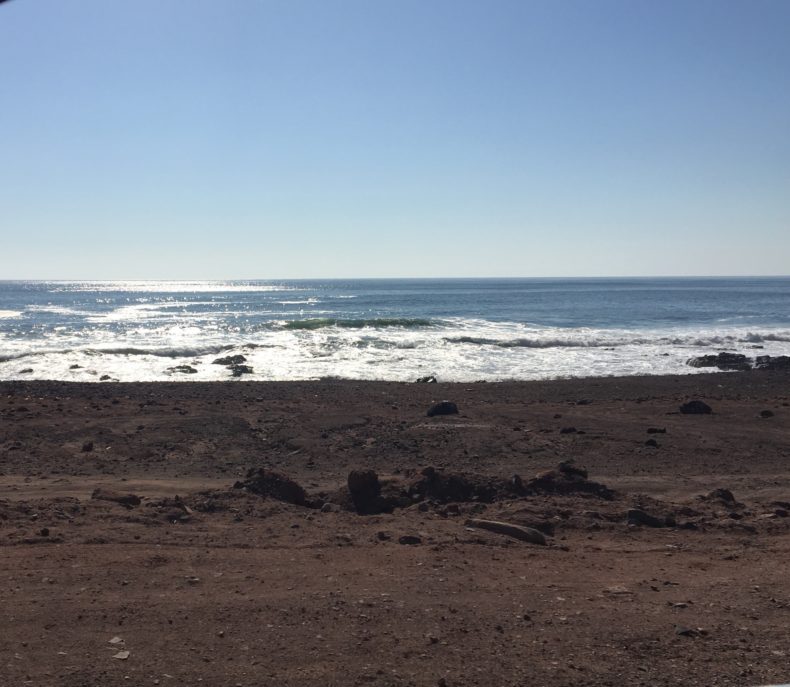
Driving in a foreign country is a good way to turn your head inside out. It shakes the cobwebs and forces you to rearrange the heavy furniture of your mind. You need to make room for thoughts such as 10 mil is how many pesos is how many dollars? And what is the phrase for a full tank of gas? And if I put my backpack and jacket in the passenger seat, and adjust my hat on them just so, will the miners in that truck behind me be fooled into thinking I’m not alone?
I have always liked driving, especially when I have good music and a long enough trip for my thoughts to really open up. It is like a form of meditation, in that it’s both exhausting and refreshing. Driving in a foreign country, where you barely speak the language, is like competitive-level meditation.
I did the most intense driving of my life earlier this year, on a road trip up and down the coast of northern Chile. I wrote a lot about it in this essay, which just published, so please go read that. But I’ve been thinking a lot about all the other absurd driving I did on that trip, all by myself in the oldest and most barren desert on this planet.
After my stay in Salar Grande, in the northern reaches of the Atacama Desert, I drove an hour in the wrong direction to avoid revisiting a horrific switchback to get down the coastal range. The road was paved to accommodate the nearby salt mine and trucks traveling to and from the coastal town of Iquique. It appeared to be in need of shoveling: Salt blown from speeding trucks blanketed the edges in a fine white powder like snow. I saw a billboard that read, in Spanish, “Out here, the only thing that should speed is the wind.” Trucks hurtled past.
On the coastal road from Iquique to Antofagasta, the focus of my fear alternated between the very rare appearance of other, potentially dangerous drivers and the road itself. As I drove through road cuts blasted off the side of the Andes foothills, weird rocks towered above me. It felt like I was driving on the Moon. At times, I negotiated the sides of cliffs whose faces dropped a thousand feet to the sea. After every ascent and descent, I pulled over to wipe my soaking wet palms, and to shake out my aching wrists. “Is There Life on Mars?” David Bowie sang to me.
At one point, after a couple hours of driving south, I needed a break. I needed to smell the ocean, mere feet to my right. I pulled over to the shoulder, parked my silver SUV on the sand, and walked a few feet. I was completely on my own. I saw nothing alive—no gull, no driver, no seaweed, no plant. I stared at the Pacific and felt my chest tighten. I was thousands of miles from my family, and I have never felt more alone.
The ocean was loud, dashing against dark rocks, and within a minute I felt like its rhythm was a part of me. It was going to swallow me and the sun was going to drive me mad. I strained to see anything else alive, some sign that I was still on Earth, but I saw nothing but sand and blue.
I squinted for a minute. The entire planet looks like this, from a great distance. From the Moon, you can make out the continents, patches of brown and green beneath a light frosting of clouds. But the general impression of Earth is one of blue and white. Ocean and sky. Our blue marble.
I listened to the Pacific and took a step forward. I was on Earth. I was so lucky to be here. So goddamn lucky I suddenly wanted to scream. Do you know how rare it is to have a planet covered in water? How precious it is to get out of the car, walk a few feet, and touch the ocean? It was the deep blue of my daughter’s eyes. This water is flowing through me, through her, through all of us here, together. Is this enlightenment? I thought to myself. I don’t know enough about Buddhism.
It was hard to get back in the car after that. But I feared that if I didn’t, the Pacific would rise up and consume me, swallow me whole before I had a chance to tell anyone I saw it. I had to tell her what I saw.
After a few minutes I trudged back to my silver SUV, my most prized possession for those two weeks, with the possible exception of my sunglasses. La Cochita Plata carrying a sunburned bodhisattva.
The next day, I drove through a copper smelting plant and past plentiful sleeping street dogs. I stopped at the turnoff for a famous geoglyph, a gigantic carved-Earth artwork made by the Chilean poet Raúl Zurita. It is so vast that it is visible only from above. Only from the air, or maybe space — where the landscape resolves into a world, a whole planet whose only borders are water. On the ground, you would not make much sense of the curved letters. They spell Ni pena ni miedo. No shame; no fear.
I kept driving.
—
Image by the author
Title: After Pablo Neruda
(If you don’t read the poetry of a country before you visit, what are you even doing?)
I understand this! Doing my yoga breathwork, I realized how lucky I was to be breathing this precious thing – Oxygen – so plentiful and still relatively pure. I am alive, inhaling and exhaling. I understand how you viewed the Ocean with such gratitude and amazement. We are swimming in an ocean of precious air